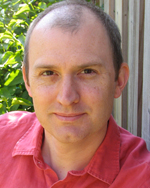Spotlight on Alumni: Kristen Hager
Spotlight on Alumni: Kristen Hager
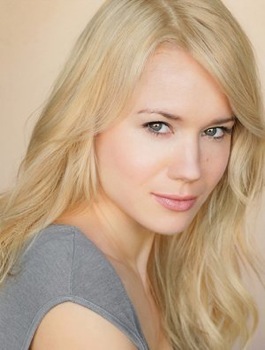 Kristen Hager
Kristen HagerSince completing York's Acting Program in 2005, I have been working as an actor in both Canada and the US. Very hard to believe that it's already been eight years since I left! Over the years there have been many ups and downs, all of which have been crucial in leading me to where I am today.
Since graduating, I have found myself on some pretty surreal sets, from Todd Haynes' I'm Not There opposite Cate Blanchett(!!!), to FOX Studio's Alien Vs. Predator: Requiem, to Universal Studio's Wanted opposite James McAvoy and Angelina Jolie. (Needless to say I've literally had to “pinch myself” on more than one occasion). Here in Canada, I've worked on such films as You Might As Well Live, Textuality, Servitude, and last year's A Little Bit Zombie. I also got the opportunity to get into the psyche of Leslie Van Houten, one of the women in Charles Manson's cult, in Leslie, My Name is Evil, which premiered at TIFF in 2009. In television I've worked on such shows as CSI: Miami, NCIS: LA, as well as CTV's The Listener, and CBC's Wild Roses here in Canada, to name a few. For the last three years I have played a Werewolf on the SyFy show Being Human. The third season is currently airing (Monday nights at 9/8c on SyFy and SPACE in Canada).
At the moment I am down in Los Angeles filming an independent thriller, Trigger. I recently wrapped another independent film, In Embryo, and wrapped a romantic comedy, The Right Kind of Wrong, last fall, which will hopefully premier at TIFF in September.
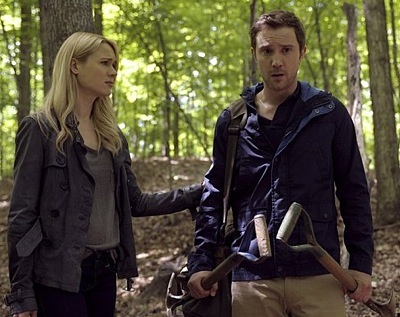 Kristen Hager and Sam Huntington in Being Human.
Kristen Hager and Sam Huntington in Being Human.Do you have any advice or tips for York Students just entering the department?
My advice to anyone entering the program is to dream big. Set goals for yourself, and don't be afraid to fall flat on your face in the process of trying to reach them. Take risks. It's very true that you will “never know if you don't try”. Now is the time to play, to find your voice, and hone your craft. And always remember to have fun in the process! Find the joy. Find what excites you. Find what terrifies you. But more than anything, find what you love about it, and why you can't live without it.
Can you tell us a moment in which your training at York was clearly useful?
My training at York comes into play on every job that I get. What I appreciated most about York's Acting Program was that it was very much based on finding what “works best for you as an individual”. We were taught many different techniques and explored many different acting styles, but we were never told that any of these specific styles was the RIGHT one. I developed a work ethic, and script/character breakdown that really worked for me personally. I use the same writing and personalization techniques that I started doing then in the breakdown of each character I play.
Additionally, a course that I took which I have found to be very beneficial now as an actor, was Psychology. Understanding the psychology behind the character you are playing is a crucial part of getting into character.
What was your fondest memory of studying Theatre at York?
I have so many fond memories of the countless hours spent locked away in the studios of the CFT Building! More than anything I am thankful for getting to know such an amazing group of talented and dynamic people who I got to spend so much time with. We were literally together from 8:30am-10:30pm everyday of the week (except Sundays)! So by then end of our four years together, we were more like family than friends. It's crazy to think that I haven't seen some of them since we graduated. In fact, that's one of the difficult parts of this business, losing touch with people who you get to know so well. I learned a lot from each and everyone in that class, and made friends for life. Being in University is such a special time in your life – such an exciting time, so take the time to enjoy it!
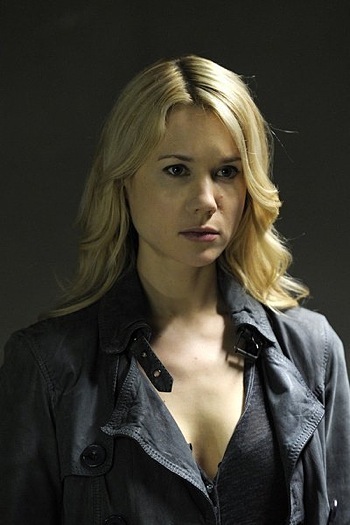 Kristen Hager as Nora on Being Human
Kristen Hager as Nora on Being HumanIf you had the chance to go back and visit your younger self as you were beginning at York, what advice would you give yourself?
If I could go back and visit my younger self, more than anything else, I would tell myself to “just stop, stand still, and take it all in”. Try your best to live in the moment. Because you are going to have so many unbelievable experiences along the way, from the people you will meet, to the cities you will see. And time will go by quickly, so don't wish it away. Appreciate where you are right now, in this moment. And know that there is something to be learned from each experience that you have. Don't take anything for granted.
Do you have advice or tips for York Students just about to graduate? About to join the job Market?
To the students about to graduate I want to tell them to have a concrete game plan. I am a big advocate of literally sitting down with a pen and paper and making a “five year plan”. Know what you want, and be willing to work harder than everyone else around you to make it happen. Don't be complacent. Because it is no joke that this is an extremely competitive field, and I'm going to be very honest when I say that at times, it's going to be tough. Be resilient. You have to be able to pick yourself up and dust yourself off. For all the jobs I've gotten over the years, there have been hundreds that I didn't get. But it is those jobs that you don't get that make you appreciate the ones you do get that much more. “Onto the next” has become a motto. Be confidant. Try not to be too hard on yourself. Be your biggest supporter. And never, ever forget what it is you love about this business, and why you're doing it in the first place. It can be scary at times, and lonely at times – having to spend so much time away from the people you love — so you have to love it. But it can also feel like the most wonderful job on the planet. So more than anything else, know that you are about to embark on an exciting ride!
Imaginative Ethnography: A Symposium
Imaginative Ethnography: A Symposium
DTF: Aragrad
DTF: Aragrad
Spotlight on Alumni: Stephanie Jung
Spotlight on Alumni: Stephanie Jung
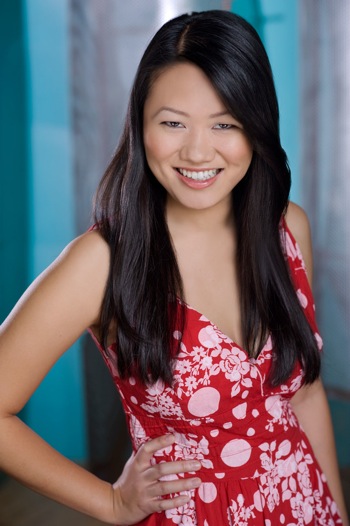 Stephanie Jung
Stephanie JungI loved my time in the Acting Conservatory. The program isn't for everyone but it was exactly what I needed when I needed it. It made me a better actor. I was lucky to pick-up some valuable tools and met some great people in the process.
I'm a Vancouverite born and raised so my first experience with Toronto summers happened the year I graduated. I booked my first gig before I graduated—Factory Theatre/Luminato's production of Tough! by George F. Walker. It was an amazing experience. We ended up receiving a Dora Nomination for Best Ensemble for the show. That fall, I got to be the voice of a Chi Chi the panda on Teletoon's Life's a Zoo which won a Gemini for Best Animated Program/Series. Some of my theatre highlights include Cahoots' The Madness of the Square by Marjorie Chan, If We Were Birds by Erin Shields at the Tarragon Theatre, and Necessary Angel/Luminato's Tout Comme Elle. Working on Tout Comme Elle was such a fantastic and giddy experience. 50 women onstage! 50! At the same time! I was in the rehearsal room with some of Canada's best actors. I was like a teenager, grinning like a fool, because I was working with people whose work I had admired for so long. Unreal.
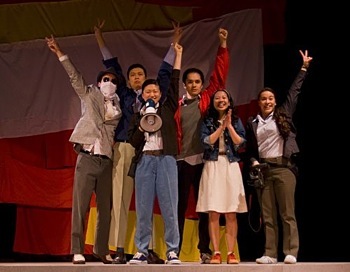 The Madness of the Square by Marjorie Chan Produced by Cahoots Theatre Company
The Madness of the Square by Marjorie Chan Produced by Cahoots Theatre CompanyWhat is your fondest memory of studying Theatre at York?
Seems silly—but I loved that we got to do Restoration scenes complete with costuming in acting class in third year. I'm obsessed with ornate costumes (corsets and anything with a giant hoop skirt) and loved putting on layers of foundation garments and skirts to complete the Restoration “look”. In acting class we had quick lessons in learning how to walk properly with our new hoop skirts and the fine art of flirting with a fan. We even donned our corsets for voice class to learn how to properly access our breath in such a constricting piece of costume.
Did connections, friendships, relationships you made at York help you afterward?
Absolutely! I'm from Vancouver so I was brand-spanking new to the Toronto theatre scene. Some of my closest friends were fellow theatre Yorkies who had graduated before me. They showed me the ins and outs of the Toronto scene and introduced me to people who worked in all areas of theatre.
What was the most challenging aspect or experience of training/studying at York?
My third year in the acting was probably one of the most challenging and exhilarating years of my life. Classes were intense, the workload sometimes felt like too much, and our unmounted rehearsals took up weekday evenings and Saturdays. I lived with a roommate who wasn't in theatre and there were times where I didn't see her for three days straight because she was in bed by the time I got home and I usually left for school before she woke up. It was an insane schedule but I loved every minute of it. Sounds cheesy right? Absolutely. But it's true.
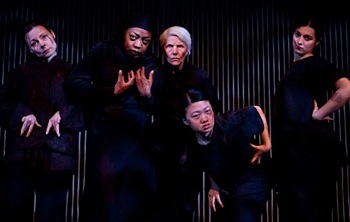 If We Were Birds by Erin Shields
If We Were Birds by Erin ShieldsProduced by Tarragon Theatre
Do you have any advice or tips for York students just about to graduate? about to join the job market?
- You will probably be poorer after you leave school than while you were a student, especially as you're trying to find a job that will be flexible enough to work around with you being an artist. Learn to budget. Seriously.
- Keep every receipt. It will be important for filing your taxes as an artist. If you don't know/can't do/want-to-poke-your-eyes-out-when-confronted-with-the-idea of filing your own self-employed taxes, invest in an accountant that specializes working with artists (not H&R Block). Best investment you'll make.
- Set aside a percentage of each acting paycheque for taxes. Put it in a savings account that you don't touch. This will help if and when you have to pay taxes come tax time.
- Keep taking acting classes after you're done York. Acting is a muscle. It needs a really good workout every once in awhile.
- Don't show up late for rehearsal. Turn/Silence your cell phone in rehearsal. Getting hired for a job is sometimes not just about your talent but whether you are easy or difficult to work with in the rehearsal room. People will talk about your work ethic and your talent in the same breath.
- Go see theatre.
Photo Gallery: A Midsummer Night’s Dream
Photo Gallery: A Midsummer Night’s Dream
Photos by John Jacques.
Photos by John Lauener.
Spotlight on Alumni: Rong Fu
Spotlight on Alumni: Rong Fu
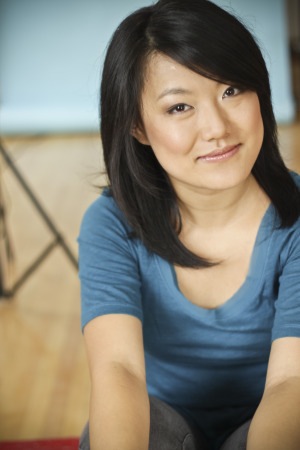 Rong Fu
Rong FuI can’t believe it’s almost been a year since I finished school. In that time I’ve been able to catch up with friends, binge on television, and drink coffee for pleasure. Most of all, I’ve been able to enjoy being an actor.
My first job upon graduation was being cast in The Crucible and The Royal Comedians at Soulpepper Theatre Company. It was my first time acting professionally on stage, and it turned out to be a remarkable experience filled with great people. I was pleasantly surprised that the production departments at York and Soulpepper functioned alike. This, I think, speaks volumes to the professionalism of York’s production program.
I received my first television credits by working on shows such as Rookie Blue, Cracked, and Warehouse 13. I’ve also appeared in several commercials. Acting on camera was something that really intimidated me. The first time we worked with a camera at York, I prayed for the fire alarm to go off so that I can skip my turn. But now I have grown to love it – a lot.
Currently, I am the playwright in residence at fu-GEN Asian Canadian Theatre Company, and am working on a new play that will hopefully be ready for a workshop in a few months. When it comes to new play development, I’ve also been engaged as an actor in various script readings, workshops, and presentations. In addition, I am a mentor for The AMY Project, a theatre mentorship and development program for young women in Toronto.
Do you have any advice or tips for York students just about to graduate and join the job market?
Have fun at auditions. I left school expecting that the audition room would be this awkward and hostile place – it isn’t. Or it certainly doesn’t have to be, but that’s entirely up to how you approach it. As long as you walk in with a positive attitude, you will walk out feeling great. The people on the other side of the casting table are really nice, and so are the other actors in the waiting room. At least that’s been my experience so far. There are a lot of great opportunities out there so stay positive and keep cynicism at bay. Remember that talent is secondary to hard work, professionalism, and being a good person.
What was the most valuable thing you learned while studying in Theatre at York?
Don’t take everything so seriously or personally for that matter. While it’s great to have conviction, it’s equally important not to let it get in the way of personal growth and happiness. Once I absorbed that lesson (after much trial and tribulation) I was finally able to have fun with the work again.
What did you NOT get taught at York that you wish you had been taught?
Taxes! I’m doing mine now and I wish I was more knowledgeable in this area. We covered some basics in Peter McKinnon’s class, but a more detailed session on how to prepare taxes as actors would have been really helpful.
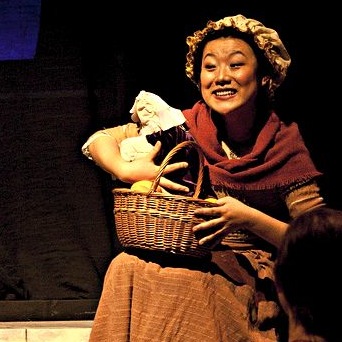 Rong Fu in Restoration
Rong Fu in RestorationWhat is your fondest memory of studying Theatre at York?
I loved working on all of our fourth year productions, but the one I had the most fun with was playing Mother in Edward Bond’s Restoration directed by David Storch. It was our final production and it was a musical. I was very skeptical when I first read the script, especially since I’m not much of a singer. The rehearsal process turned out to be wonderfully challenging and deliciously fun. The more we worked on it, the more I fell in love with the story, characters and themes. In the end, I think we put on a great show.
What was your favourite place at York, and why?
The ACE 207 studio because it’s so spacious and there’s a microwave in the dressing room!
Spotlight on Alumni: Beryl Bain
Spotlight on Alumni: Beryl Bain
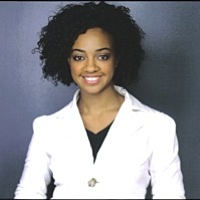 Beryl Bain
Beryl BainI graduated from York in 2005 with a B.F.A in Acting. Since graduation I've had a variety of opportunities come my way. I've worked in both film and theatre as an actor. Some special projects in my career so far include: performing at the Shaw Festival for three years, playing “Susan” in the Canadian premiere of David Mamet's Race, recently playing “Nadia Beckles” in Awake, several national commercials and multiple television appearances. I've also had a bunch of jobs, done some good travelling and learning a heck of a lot since then.
What was the most valuable thing you learned while studying in Theatre at York?
Artistic discipline.
What was the most challenging aspect or experience of training/studying at York?
The lack of perspective that comes with the nature of the program and to some extent, the campus location.
What is your fondest memory of studying Theatre at York?
Lying on the studio floor. Looking into the eyes of my classmates. Wandering the York campus late at night with my friends laughing my face off.
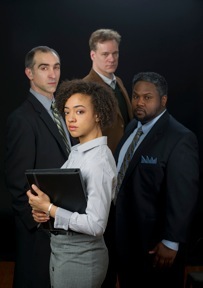 Beryl Bain in Race
Beryl Bain in Raceat Theatre Yes in Edmonton.
What was your favourite place at York, and why?
Once, my friend Anne and I, after hanging out in York Lanes over Falafel Hut for like 6 hours, went campus exploring. We were both like, it’s late, wanna go home? And we were both like, Nah. What part of the campus haven’t we seen before? So we went to Osgoode Hall, looked at the graduation photos of students from the early 1900’s, then we prowled around the moot courtroom. It was awe-inspiring to see these ancient photographs of all these students, and wonder what happened to them, what they went on to do. It was so random. So I’m going to say Osgoode Hall, even though I never took a single class there. Second would be Winters quad, and third is York Lanes. Fourth is Vari Hall. There are some great buildings at York!
What was one thing you enjoyed about York that was outside of the Theatre?
My anthropology course. I actually really enjoyed researching and writing papers. I liked the gym, and Winters Residence was so much fun.
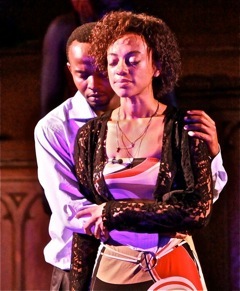 Beryl Bain in Awake!
Beryl Bain in Awake! Expect Theatre/Spark Production
What did you do for the first summer/year out of the program?
I worked at Williams-Sonoma, and wrote letters to theatres. I had meetings with my new agent and tried to find work for myself. Towards the end of the year, I got a job doing a TYA show run out of one of the city’s museums, and I think I did an insurance commercial that year too!
Do you have any advice or tips for York students just entering the dept.?
Find the people/careers/institutions that interest you before you go to school. This is my biggest piece of advice. Have a few ideas about how you would like to make your mark. Document what you dream about, be specific and carry examples with you. Bring with you a strong idea of what YOU would like to get out of the program, and what you think YOU need to achieve your goals. This will change, but at least you come to the program with a strong idea. You should certainly be flexible to the ideas and knowledge that the program has to offer, but do not, do not forget the dreams that brought you to the program in the first place. You will need them in the future, no matter which path you end up taking.
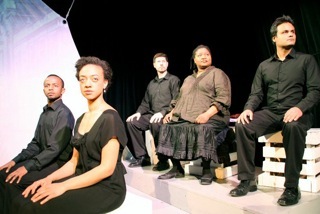 Beryl in I, Marcus Garvey
Beryl in I, Marcus GarveyTheatre Archipelago/b current
Do you have any advice or tips for York students just about to graduate? about to join the job market?
Oh my God lots. Advice I’m constantly practicing. It’s an ongoing thing.
Same as above, remember your interests. Remember what struck you about this profession you’d like to pursue. Keep tangible examples close to you at all times, absolutely anything that lights your fire.
Because I am currently a professional actor, I have lots of advice that I can pass on to recent grads that was useful to me. My apologies if it isn’t particular to your stream, however I think that most of it is useful for all self-employed people no matter what you’re doing.
1. Stay in practice. This cannot be stressed enough. Whatever your inclination is, do it whether you are being hired right now or not. There are lots of ways to do this without paying lots of money. For example, a group of friends can be a mock audition panel for themselves, or shoot scenes in the living room. Classes are very useful of course, but remember that you don’t always have to be a student to learn. Remember, if you don’t find what you’re looking for, you have to make it.
2. Ask people questions, as many professionals as you can. Don’t be afraid to call up the people you admire. The worst they can say is no.
3. Get organized. You are self-employed. My experience is, in order to be self employed, you need to alternate between the big picture (the vision of your career I mentioned earlier) and the details. Most resources for self-employed people apply to you, including money management and taxation information. Practice tracking everything. What you auditioned for, what worked, what didn’t. Details about the production you are auditioning for. Wear the right clothes (tip: you don’t have to buy them, keep the tags on!) do your hair and makeup according to the type of thing you are going out for. Track what shows you see. Track your business expenses, keep your receipts, track what money’s coming in and what’s going out. Etc. The tracking helps you run your career like a proper business. That’s what I mean by details.
4. Ok so about money. You may want to watch your attitude towards money. Bottom line is, being solvent is really important, and ultimately more relaxing in my opinion, but you don’t have to let either extreme tyrannize you. (For example, oh my God, I can’t work a joe job, I’ll have no time for my art and I’m better than that, and that’s what credit cards are for or the other extreme Oh my God, I’m still working in this shitty job because no one will hire me because I have no talent and mea culpa the world is awful I think it’s safe to say that most actors have experienced these extremes and both are wrong. Find a balance and find it now.) Stay focused on goals and pay your bills. You’ll have to do both. Find a way. Treat every job, even the shitty ones, with respect. Ask other artists what jobs they do if you need more income, communicate honestly about your artistic life with your employers, be disciplined about your craft, and you’ll be fine.
5. About attitude. You’ll have to walk a fine line between getting discouraged and being unrealistically confident. You have to have confidence and perseverance, but a lot of the time, the struggle of the actor is over emphasized, often by people who secretly wish they’d given it a try. You will likely struggle, but it doesn’t mean you have to buy into the whole starving artist thing. This is a choice. You will give it your absolute all, meaning you will work on your craft, keep your ear to the ground, work on your self-image, whatever YOU want it to be, and give it your damn all. You have to enjoy it relentlessly. Don’t be a whiner. Ultimately, nobody has a gun to your head, right? You’re choosing this.
If you had the chance to go back and visit your younger self as you were beginning at York, what advice would you give yourself?
Do. Not. Gossip. The program, who gets in and who doesn’t, absolutely does NOT matter. I have to say, I regret any amount of time I spent talking about that stuff. People matter, politics truly don’t. Personally, I would have told myself to stay focused. I figured it out eventually.
Did connections, friendships, relationships you made at York help you afterward?
Yes. I worked with many Yorkies after school.
In which ways has your education at York, and in Theatre in particular, helped you in work and life?
I suppose the most prominent thing would be that people take you more seriously as an artist if you’ve studied. It helped get those early auditions and agents that helped me get my start.
Can you tell us a story of a moment where your training at York was clearly useful?
Working at the Shaw Festival, I was familiar with the vocal exercises that our coaches used. I knew IPA!
What did you learn at York that has been of greatest value?
Feel your feet on the floor.
What did you NOT get taught at York that you wish you had been taught?
More physical theatre might have been useful. Generally I would say more scene work, earlier on so that the exercises we study can be put to practice. Ultimately, you should be in school to practice your face off.
I might also suggest that professional confidence might have been more emphasized for each individual person in the acting stream. (I don’t mean arrogance, by the way, I mean confidence). I remember their being a great deal of emphasis on casting, even in the earlier years, which I now profoundly disagree with. Here’s the thing. School should be for practice of craft. You don’t need to practice getting cast or how to get cast . It is beyond your control, and frankly, it isn’t what you’re paying to learn. Ideally, one should leave school having practiced to death whatever it is they have to offer. It’s quite an important that an actor have genuine confidence, as well as generosity. You should leave school confident that you have something to give. Focus on your own growth and improvement, your own image and your own skills.
Photo Gallery: ‘Tis Pity She’s A Whore
Photo Gallery: ‘Tis Pity She’s A Whore
— Photos by John Jacques
Eric Armstrong: Dialect Coaching on “Arigato, Tokyo”
Eric Armstrong: Dialect Coaching on “Arigato, Tokyo”
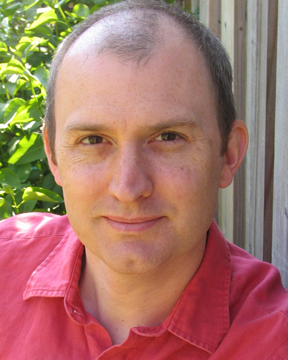 Eric Armstrong
Eric ArmstrongBuddies in Bad Times‘ Artistic Director, Brendan Healey, contacted me last spring to check my availability for a show he was working on, Daniel MacIvor’s new play, Arigato, Tokyo. I had worked with Brendan on Sarah Kane’s Blasted at Buddies in the Fall of 2010, and was delighted with the opportunity to work with him and his team on this new show. The play would be workshopped for a week in the summer of 2012, when I would do the bulk of my work with the actors, and then, during rehearsals in February/March of 2013, I would get to help “polish” the finished product. On top of this very beneficial rehearsal plan—good for me and the actors because we got to lay the ground work for the accents required well before the show goes into rehearsal—was the added bonus of the accents I would be coaching: Japanese! As a middle-aged white guy, I get called on to coach anglo-centric, European accents a lot of the time. This was going to be a challenge that I’d been looking forward to for some time.
Having students coming from the diverse population of Canada, and especially Toronto, I had, of course, worked with Asian students who needed to learn a range of accents. One of the great tragedies of traditional voice training is that Asian accents in general have not been one of the “standard” accents actors or voice coaches typically learn in grad school. So, in collaboration with a number of Asian students, I had made a point of working on a Japanese accent before in order to better equip them for the market they were entering.
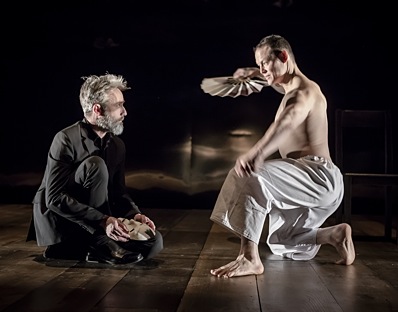 David Storch and Michael Dufays in Arigato, Tokyo
David Storch and Michael Dufays in Arigato, TokyoPhoto: Jeremy Mimnagh
Analyzing an accent quickly is something that I’ve had to get good at over the past ten years of coaching for film and television in Toronto. I frequently get called to provide accent resources for a film or TV show with only a few days warning, and sometimes as little as a couple of hours. I gather audio samples of native speakers, listen very carefully to the sound of their speech, and break the various component parts of the accent down into an outline for the actors to reference. I then record an accent lesson where I carefully walk the listener through the various components of the accent. Next, I provide a hand-out and this audio file to the actors, along with a list of links to audio samples of native speakers I’ve found on the internet, or that I’ve recorded and uploaded myself. This forms the “package” that the actors get; back in the old days, they would get a paper hand-out and a CD, but today they get a link via email to a website featuring these materials. You can see the site I built for Arigato, Tokyo for yourself, if you’d like. I send this out to the actors about a month before the summer workshop. Of course, the great benefit is that they then show up to the workshop quite well prepared, ready to do the detail work on the accent, not the gross motor skills of merely familiarizing themselves with the accent.
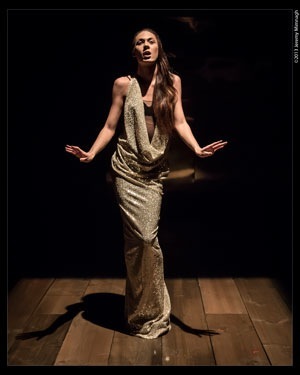 Tyson James in Arigato, Tokyo
Tyson James in Arigato, TokyoPhoto: Jeremy Minmagh
During the week-long summer workshop, we began with a reading of the play, and questions. I asked a lot of questions, and managed to provoke some really interesting responses from Brendan. Though he auditioned just about every Japanese and Asian actor in Toronto, he cast the play with bi-racial actors, none of whom are Japanese. His reasons for this are complex and fit the world of the play perfectly: it is a memory play of a “mainstream,” caucasian Canadian author who is visiting Tokyo, on a book tour. The characters we meet in the play are what he remembers of them, and his memory is not necessarily clear. The actors had all played characters with asian accents before, but never had a coach to work with them; they were excited for the opportunity to have some support. Over the course of the week, we met one-on-one repeatedly in order to go through the script line-by-line, and, at times, word-by-word. One of the characters has a very strong accent, one a very mild accent, and one is somewhere in between, and shifts depending on the context! This is where the “design” component of my job really comes into play. I’m not merely teaching a set form to the actors; I’m tweaking the choices, in consultation with the actors, to reinforce their image of the characters. Accents modulate, subtly, in response to the given circumstances of the scene: are they more emotional? more in control? Luckily for me, the sections of the play that are actually in Japanese were covered by a Japanese language expert.
One benefit of this research and workshop opportunity is that it made me an “expert” on something that other voice teachers really wanted to learn about. Last summer’s conference of the Voice And Speech Trainers Association (VASTA), held in Washington DC, allowed me an opportunity to team up with a group of Accent coaches from around the world and present a panel on Asian accents. While I covered Japanese, my colleagues presented introductions to Mandarin, Cantonese, Korean and Vietnamese. We prepared resources to share with the conference attendees, and we made them available on a website on Asian Accents that we then shared around the community.
By the time rehearsals began in February, the actors had internalized the accent, and so my work with them focused more on making subtle adjustments. At this point we tweaked choices to make sure that the play’s text was intelligible. Is the accent too strong here? In this emotional moment, the accent seems to be disappearing. The rhythm of the accent (very even) seems to be de-emphasizing key syllables of the most important words in the scene, leaving the listener confused. By consulting with the actors, I guided them to make more specific choices that reinforced their vision of their characters, while supporting the director’s vision of the play and the playwright’s intent. A delightful puzzle for me!
Come opening night, there’s nothing left for me to do other than sit back and enjoy the show. It’s an honour to work with such talented actors, director and playwright, and a pleasure to work on skills that will help my York students in the future.
Arigato, Tokyo plays at Buddies in Bad Times Theatre, MARCH 16 – APRIL 14, 2013.
Review: thestar.com ★★★★
